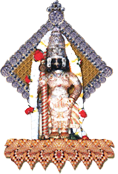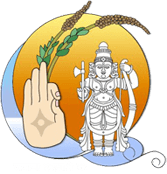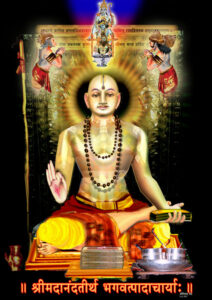
In this chapter Vasudeva’s sporting activities till he attains the age of 10, when he took the vows of an ascetic are described. These include his devotion to God immanent in all deities, extraordinary talents in learning, his thoroughness in understanding every thing in depth, his great strength and sportsmanship, his gratitude to his teacher and friendship with his fellow pupils etc. The poet gives the picture of an extraordinary personality with great talents not yet fully revealed, but extremely human and compassionate towards others.
Vasudeva visits temples
The relatives of the Bhatta couple loved them as the parents of the beautiful smiling Vasudeva, whom they wanted to see again and again with great pleasure. Once, the family went out with great hustle and bustle for a joyful family festival (marriage) along with their relatives to a place called Naduvairi.
Note: Anumadhvavijaya says that Vasudeva was three years at the time.
There was a great deal of coming, going, meeting and honouring of relatives by each other which made the gathering noisy and crowded. The boy left the place alone, knowing that the mother will not notice his absence.
“Where are you going, my dear child, it is not correct for you to leave your own people and go like this” – were the questions asked by wayfarers who saw him on the roadside – but his answer was just a placid smile.
Soon he reached the temple of the God in the forest (KananaDevata) [in Kodavoor] and prostrated in front of the Lord of Ramaa, there. Then he went on to the temple called by the name Narikela (coconut) [Talekude near Bannanje] and saluted Hari again there.
Note: The Deity in Kodavoor is Shankara Narayana and that in Thalekude (near Bannanje is Mahalingeswara. In both places, Vasudeva offered his prostrations to Narayana, the Supreme Being only installed/immanent in the Deity installed there.
Vasudeva was himself an object of great pleasure to the eyes and minds of onlookers who saw him, like the Sun causing the Lotus flowers to bloom. He went on to Rajathapeethapura (Udupi) being eager to have the darshan of the Lord with his eyes big with happiness experienced by seeing the Lord wearing the Lotus on the Navel.
He prostrated before the Lord Anantashayana perfectly, (with both body and mind totally concentrated on Him). Gods and Brahmins who saw his prostrations with wonder considered that they are superior in earning merit to the performance of a large number of great Ashvamedha Yajnas correctly in the prescribed manner.
Note: Vasudeva, inspite of his three years of age had covered large distances – Shankara Narayana temple at a distance of 1.6 Kms from Nidiyur (location of marriage ceremonies), a further 3 Kms to Thalekude temple, a further 2 Kms to Chandramouleeshwara /Ananteshwara temples in Udupi – a total of 7 Kms .
It is not that Vayu does not constantly offer his salutations to Hari, see Him and recite His eulogies. But by performing these actions (in temples), he set an example to the good people aspiring for Moksha demonstrating the necessity of doing so.
Bhatta searches for and finds his son
Not seeing his son in the crowd, Bhatta, the great Brahmin, who dearly loved his son, went in search of him. He followed his foot steps quickly asking people on the way frequently about his son.
Eager to see the smiling lotus like face of the son, he soon located him by getting continuous directions about the way the boy had gone from wayfarers, in the same manner as the honey bee eager to secure honey is guided by the smell of the lotus flower wafted by the breezes.
He had earlier controlled the tears welling from his eyes due to the great sorrow of losing his son, as inauspicious. Now, he controlled them again for the same reason as the tears came again due to love of his son (when he got him back). He said to his son.
My son, my little child, please tell me every thing correctly. You have come alone this far now. In this long trip, who was your companion, when you had none of our people with you?
The lotus eyed child listened to the words of his father with attention and replied in his sweet lisping words. “While coming to temple in the Kodavur forest and going further to the Narikela temple, my friend and companion was Narayana, resident in the Kodavur temple”.
When I came to this place after offering my obeisance there, Hari (of the Narikela temple) was my friend and companion. Here I have prostrated to Him only, who is immanent in the deity of the temple of the east (Chandramouleeshwara of Udupi).
After that, I have come here (Ananteshwara in the west) along with God who is immanent in the temple in the east, and have offered my prostrations to God (Ananteshwara) who possesses all the auspicious possessions here. Saying this, the child was honoured greatly amongst the gathering, which was filled with surprise and pleasure
Note: The places mentioned here are actually there even today and are known as – The place where the marriage function took place was Nidiyur, which is about 5 miles west of Udupi near the sea shore. There was a forest about a mile away from there called Kodavur in the south east, where there is an ancient temple of Shankara Narayana. To the east of this place, about two miles away is Thalekude or Narikelyupapadanthara, now called Bannanje, where Shiva is worshipped in the form of a Linga. One mile away from there is Udupi, with two temples, the one in the east known as Chandramolueeswara, where Shiva is the installed deity and the other being Ananteshwara, where Vishnu is worshipped. Vasudeva has offered his salutations in all these places to Hari either directly or as the immanent deity present in Shiva also. This extraordinary feat in a child of only three years of age along with clear devotional objectives must have impressed the crowd of people present.
The Brahmin (Bhatta) prostrated before Lord Anantashayana saying – I am one with little fortune, my son is fond of wandering out alone without his people and goes around in places where danger lurks every where in the form of evil spirits and other harmful creatures. Please protect my son, Oh, the ocean of mercy, I beg of you.
Taking his son along with him, the Brahmin with great austerities and penance went home with his wife. The faces of the good people bloomed like lotuses when they saw the effulgent boy, who was like the Sun (in causing them to bloom).
Vasudeva learns the alphabet
Once, the good Brahmin taught the letters (of the alphabet) to his child, who was Mukhya Prana, whom even Saraswati, herself who is the presiding deity of all learning offers her salutations always.
“Why are you asking me to write the same set of letters written yesterday?” asked the child to his father. These words of Vasudeva (having the same name as Hari) made his father very happy (at the genius of his son).
“This child is an ocean of intellect, let not that the evil eyes and speech of others envious of his bright intellect cause harm to him” – thinking thus, the father started instructing his son at a secret place, without any one else present
Vasudeva corrects Shivabhatta
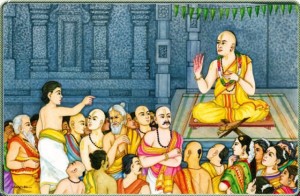
Once Vasudeva went along with his mother to the village of Neyampalli (Ghrithavalli) when they were invited to attend a marriage festival. Due to his sweet voice and excellent manner of talking, he was welcomed by his people.
Vasudeva with the great intellect in a child’s body saw a Brahmin with the name Shiva born in the Madinaya (Dhauthapatodbhava) family reciting a Katha (purana story) to a large audience in a hall.
Vasudeva who was sitting among the audience and (already) skilled in the manner of correctly interpreting texts said slowly with a smile to the speaker these words with pure diction – “What was stated by you was different and is not in accordance with the intentions of great persons” (like Shuka etc).
The audience sitting there and listening to Vasudeva’s words did not regard Shiva (as more trustworthy than Vasudeva) – who would care for the crying jackal, when the lion cub roars.
When the people asked him to recite the passage with the correct meaning, he gave it (as acceptable to the great). He was honoured well not only by the surprised persons there but also by the gods, who were worshipful of this first victory in debates (of Vasudeva/PoornaPrajna).
Vasudeva gets confirmation from Bhatta
He came back with his mother to his father’s house and gave him a complete report of the happening. He asked his father – Tell me whether Shiva had made the incorrect interpretation or was my statement incorrect?
“My son, what you said was correct” – so replied the father. He thought with surprise that his son’s scholarship was natural to him as it is due to his deity’s (Ananteshwara) enormous blessings manifesting itself increasingly in the child.
Note: This incident illustrates Vasudeva’s command over the subject and his clear incisive knowledge.
Vasudeva insists on completion of narration by his father
On one occasion when his father, who was the first amongst those giving discourses from Puranas, was narrating very competently a Katha (story from Puranas) to a gathering around him, the bright child who was the cynosure of all eyes and minds of the people present asked his father to repeat a passage again.
He asked his father gently – how is it that when giving the meanings of the names of different trees, you have left out the word – Likucha, and have continued with the narration?
When his father could not give the meaning even when asked like this, and the people there wanted to know it, he gave the correct meaning as a type of Jackfruit tree. The gathering of people gave him an unprecedented honour.
Note: This incident illustrates that Vasudeva/Madhva would not compromise on facts and data, leaving none unexplained or not taken into account. The same trait is visible when he explains brilliantly the threefold meanings of the Vedas, Mahabharata etc, which other schools tend to take partially as it suits their tenets, leaving out others as unimportant, repetitive, meant for lesser persons etc.
Vasudeva’s Upanayana
Vasudeva thus demonstrated many such acts (of his extraordinary capacity) by which the whole world became surprised and curious about him. The great Brahmin thought that as his child is of the proper age (5 years), he should perform his Upanayana ( Sacred thread ceremony).
Bhatta, who had a large circle of relatives bound to him with strong ties of affection, decided on an auspicious Muhurtha (period for the ceremony) taking into account the star and planetary positions and with no adverse features. He performed the actual ceremony surrounded by the noise and bustle of a large crowd of Brahmins.
Divine goddesses like Lakshmi, Saraswati, Bharati etc who are the deities who control the sacred vedas/Shastras along with their husbands had been desiring to sport on the stage in the form of the lips of Vasudeva (in the form of the Vedas/Shastras) for a long time. They were very happy to see from the heavens the ceremony being performed along with their consorts (in anticipation of the future). This is wonderful.
Madhyageha Bhatta who was very learned and who had collected all the different requirements for the prescribed ceremonies completed the offering of Havis into the sacred blazing fire. He performed the Upanayana of his well adorned and healthy son who had his head shaved providing for the Shikha for the occasion.
The father instructed his son – “Serve the fire and preceptors (by performing prescribed Homa rituals and performing services to the latter), observe all prescribed disciplines (like Brahmacharya etc), let your conduct be exemplary, study the good scriptures well”. The gods who were observers of this event laughed at the humorous sight of the teacher of all the three worlds being instructed thus by his father.
When teaching his son, the Brahmin became very happy when he saw that his tender son who had excelled Kumara (Skanda) in celibacy (Brahmacharya), always observed correctly the prescribed rituals with no errors and was naturally clever in them.
Vasudeva who is the lord of the world has concealed his wealth, strength and other qualities and masqueraded as a child walking around (in an ordinary environment) like a poor man going around in his single garment. This gave rise to merriment and wonder in the heavenly assemblies of gods.
(Note : Some stories about Vasudeva are not given in Shrimadhvavijaya, but given in Sampradaya Paddhati of Hrishikesha Tirtha, a direct disciple of Acharya Madhva himself. These stories are – dry stick growing into a tree, jumping from Vimana Giri to his house leaving behind a foot mark, creation of Vasudeva tirtha, etc. These are also authentic.)
Vasudeva flourishes a dry stick into a tree
Vasudeva used to spend most of his time in Vimanagiri Durga temple which is on top of a hill in Paajaka. After all, Durga Devi is Sri Mukhya Prana’s real mother. One day his father saw Vasudeva going to the temple holding a dry stick (danDa) in his hand. His father asked, “Why are you roaming like a sanyasi? What is your intention?” Vasudeva replied, “I will re-install Vaishnava faith and prove to the world the Sarvottamatva of Lord Hari”.
Father said, “In this kaliyuga nobody wants to follow dharma, nobody wants to know about God, who will listen to you in the first place? It is as impossible to uplift dharma in Kaliyuga as it is to bloom the dry stick in your hand”. Vasudeva did not reply, but he quietly fixed his danDa in the ground and watered it. His father thought that Vasudeva is playing, but within few days the dry stick blossomed and grew into big tree. His father was surprised by the powers of his son and the will of the God. Even today, the tree can be seen in Paajaka.
Vasudeva destroys an Asura Manimanta in the form of a snake
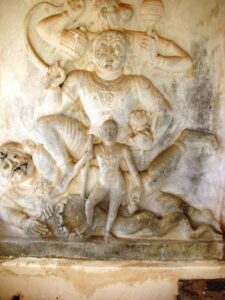
One demon by name Manimanta was looking at Vasudeva performing miracles such as planting a dry stick and making it grow. He came to know about the intentions of Vasudeva of reviving the faith in Lord Hari, and wanted to stop him. So he decided to kill the tree which Vasudeva had planted as proof of his intention.
He took the form of a big poisonous serpent, and sunk his teeth into the tree, but nothing happened. He did not know that if Acharya Madhva touches a thing, that thing cannot be destroyed by any person or poison. Manimanta was very angry at this, and wanted to kill Vasudeva himself, and was waiting for a suitable occasion.
When Vasudeva was passing by, Manimanta wanted to bite him and kill him. But Vasudeva came to know about Manimanta’s intention, and sportingly killed the serpent by crushing its hood under his toes. In the process, the rock on which Manimanta was standing also cracked and dented. This place can also be seen even today in Paajaka.
Vasudeva jumps from the hill
Once when Vasudeva (young Madhva) was on top of Vimanagiri hill, his mother called him for eating food. Vasudeva immediately responded to the call and jumped from the hill in front of the house. This great feat is nothing for Prana devaru who had crossed the sea with one leap to reach Lanka, and who had jumped from Lanka to the Himalayas bring the Sanjeevini hill during his avatara as Hanumanta. By this act Acharya is telling us to respond immediately to the words of mother and father.
Feet impressions of Vasudeva formed on the rock ground in front of his house. Sri Vadiraja Tirtha later built a temple in the same spot.
Creation of Vasudeva Tirtha (pond)
Young Madhva used to daily take bath in the four sacred tirthas (lakes) created by Lord Parashurama himself (explained earlier). These four tirthas are Parashu tirtha, Dhanus tirtha, Gada tirtha and Bana tirtha, which were capable of giving moksha to people who dipped in them. His mother was very much worried about his son taking bath in four ponds daily. On one Saadhana dvadashi day she insisted Vasudeva not to take bath in all four ponds, but to take bath in one of them and return home fast. Vasudeva did not want to disrespect his mother’s words. Nor did he want to give up the punya of taking bath in all four ponds. So he inserted his danDa into the ground. The danDa went inside the rock like a bore well, and the water sprung and formed the fifth lake. This pond is now called Vasudeva tirtha.
Vasudeva’s mother then felt sorry for depriving her son of the punya of taking bath in the four ponds. Vasudeva said, “don’t worry, water from all the four sacred ponds are present in this fifth pond. One who dips in this pond will get the benifit of dipping in all four. To prove this, I will plant the aShwatha plant upside down. If my words are true, then the plant will grow, else, not.” Saying thus, young Madhva planted a Ashwatha plant upside down, which continued to grow. Even today this tree can be seen in Paajaka, proving the sanctity of the Vasudeva tirtha.
Vasudeva goes to Gurukula
Though Vasudeva showed himself and acted as a human being, he is Mukhya Prana, the dust beneath whose feet is applied with great respect to the heads of gods such as Ishwara, Brihaspati, Indra and other gods. He started study of the Vedas after saluting the Brahmins by falling at their feet.
All the learning of the Vedas, arts such as music along with Narayana (the wielder of the Chakra) who is mainly extolled by them are always present in the mind of Vasudeva as clearly as a ball held in the palm of his hand. But he also pretended to study like an ignorant human being, though he is the teacher of all.
Vasudeva in sports
After the lessons, Vasudeva played happily with a large number of fellow students of his age and those senior to him who were good at sports at places far off from the teacher’s place.
He would indicate the point to be reached and run immediately along with his friends running fast. He would be first there effortlessly. This was no surprise as he was none other than Pavana or Mukhya Prana, who can beat even the speed of the mind.
In jumping long distances, Vasudeva in this birth (as a brahmin boy) conquered all his friends easily. When he had incarnated as Hanuman, he had excelled other monkeys like Angada, the son of Vaali, when carrying out the desire of Rama (for jumping over the ocean in search of Seeta).
When Vasudeva defeated his friends in water sports, they out of rivalry, threw water held in their hollowed palms at him. Vasudeva would show by his red eyes his apparent discomfort, but would always have a smile with a special luster on his face.
That son of a Brahmin (Vasudeva) caused the strong friends who cane to him one by one with an intention of wrestling to fall gently. When they came together at him, he again made them fall quickly without effort.
Vasudeva showed his immense strength in holding others tightly in his grip, getting himself released when held by others or in lifting heavy weights (effortlessly). When people called him Bhima on account of this, though they thought it was only as an illustration, it was literally true.
Teacher is annoyed with Vasudeva (Madhva)
Vasudeva sported like this, did not (appear to) study like others in his class, went home (for food etc) and came back late to the class. The Brahmin from the family of Poogavana (tOTantillAya), his Guru was unhappy at this behaviour of Vasudeva, the teacher of all the worlds.
Once during the class (for studying Vedas), the teacher angrily told Vasudeva, who was thinking of some thing else – “Oh, you stupid one, Why are you not studying properly along with your friends and are always disinterested (in studies)?”
Vasudeva replied that the repetition of the Vedic Charanas etc (a fourth part of Rik) with the intention of memorizing them is not interesting to his mind (since he already knew them all). The teacher said – “you talk as if you are a good scholar (already). Recite the text of the Mantra following this part (taught earlier).
Note: The traditional practice of learning the Veda by rote in repeating a quarter, half and complete Rik was boring to Vasudeva, who knew all of them – more than the teacher or any on else did already.
Vasudeva shows his scholarship
Vasudeva’s faultless recitation (as a reply to his teacher) of the Veda text which had all the correct qualities of pronunciation without any defects, leading to correct knowledge being imparted to others, not only created wonder and happiness in the mind of the teacher, but also in the gods watching the same.
Note: Vedas are expected to be intoned in exactly the prescribed manner with emphasis of sounds, stops, and lengthening some sounds, to convey the exact meanings assigned to them.
Vasudeva cures his friend, the son of his teacher
Once Vasudeva cured the intense, congenital and unbearable pain in the head of his friend, his Guru’s son (also named Vasudeva) in a lonely forest by blowing air from his mouth into his ear
Note: Bhavaprakashika explains that the dear friend was the son of the teacher. Vasudeva showed him the infinite previous lives he had gone through. Later he presided over a great sacrifice performed by him also.
Vasudeva creates danDa tIrtha
Madhva’s teacher toTantillaya (one who has his house in the middle of toTa or farm) had a big farm, required for the sustenance of his gurukula. Vasudeva (Madhva) noticed that the crops in Guru’s field were not healthy and were dried up. When Vasudeva asked the teacher for the reason, Guru replied that there was acute water scarcity in that place. Vasudeva decided to help his teacher and his gurukula. He inserted a danDa (stick) into the ground, and created a stream of water, which irrigated the fields of guru.
Significance of this stream is that it never dried so far, whereas the nearby streams often dry in the scorching summer. This stream is called danDa tIrtha. Even now, during the paryaya festival in Udupi, the Swamiji who is going to ascend the pITha will first take a dip in danDa tIrtha before coming in procession.
Vasudeva’s extraordinary scholarship
After listening only once to an Upanishad which demonstrates the glory of Vishnu (Mahanarayanopanishat), and Sri Mahaithareyopanishat, they were fully comprehended by Vasudeva It is no wonder as, hundreds of Vedic hymns not even heard once (by any body) have been comprehended by him by virtue of his great intellect.
Note: The Upanishad is called Prakatabhagavatee in Shrimadhvavijaya Bhavaprakashika explains that it is Srimannaroyanopanishat.
Vasudeva pays Guru Dakshina
Vasudeva, with his special capacity, gave the most appropriate Guru Dakshina of devotion to Lord Hari, in a secret place to his Guru, by explaining clearly the special meanings of the Aitareya Upanishad during a lesson on it, the correct understanding of which leads to Moksha by developing devotion.
At the end of the stay in Gurukula – the abode of the Guru, the gods prayed to Vasudeva – our lord! Destroy the wicked completely, give happiness to your own people, describe fully and clearly the concealed (by Advaita) qualities of Vishnu, do not delay anymore. Taking formal permission of the Brahmin Guru, Vasudeva prepared to take up the next phase of his work, giving joy to the gods.
The Third chapter of Shrimadhvavijaya Mahakaavya written by Sri Narayana Panditacharya, son of Sri Trivikrama Panditacharya concludes here.
